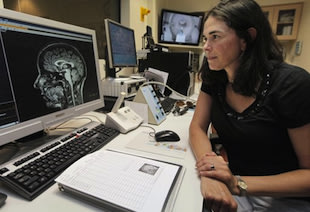Vegetative man tells doctors ‘I’m not in pain’ via MRI communication
By Eric Pfeiffer, Yahoo! News | The Sideshow – 5 hrs ago fMRI scans, like the one shown in this photo, could help doctors communicate with brain injured patients (AP)More than 12 years after a car accident left him in a vegetative state, a Canadian man has begun communicating with doctors who are monitoring his brain activity through Functional Magnetic Resonance Imaging (fMRI) scans.
fMRI scans, like the one shown in this photo, could help doctors communicate with brain injured patients (AP)More than 12 years after a car accident left him in a vegetative state, a Canadian man has begun communicating with doctors who are monitoring his brain activity through Functional Magnetic Resonance Imaging (fMRI) scans.
The BBC reports that 39-year-old Scott Routley has been able to communicate to doctors that he is not in any pain, marking the first time an uncommunicative, severely brain-damaged patient has been able to give direct answers regarding their care and treatment.
"Scott has been able to show he has a conscious, thinking mind," British neuroscientist Adrian Owen told the BBC. "We have scanned him several times and his pattern of brain activity shows he is clearly choosing to answer our questions. We believe he knows who and where he is."
Owen leads a team at the Brain and Mind Institute, University of Western Ontario, which used MRI scans to measure responses from Routley.
Traditional tests have continued to indicate that Routley is in a vegetative state, with no relevant brain activity. Owen and other doctors say this means medical text books will literally need to be re-written when it comes to evaluating patients suffering from severe brain injuries.
Routley's previous neurologist said that for a decade all test results taken from scans of Routley's brain indicated he was not experiencing any mental activity.
"I was impressed and amazed that he was able to show these cognitive responses, said University Hospital's Bryan Young. "He had the clinical picture of a typical vegetative patient and showed no spontaneous movements that looked meaningful."
Owen says the results could lead to improved patient care for those living with severe brain injuries, making a major improvement in the daily of patients, including routine tasks such as when they prefer to be fed or bathed.
And since fMRI scans do not use radiation and are considered easy to use by trained technicians, it's likely doctors could use them to communicate with patients on a regular basis.
No comments:
Post a Comment